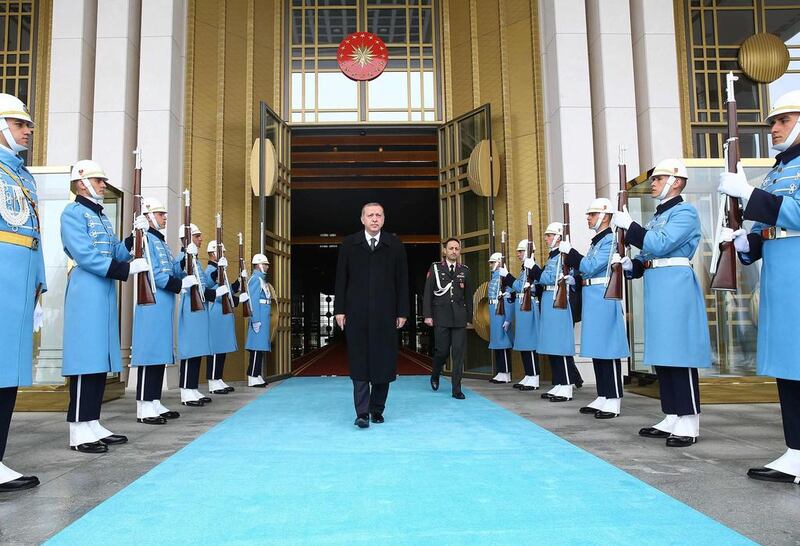Parliamentary elections in June could make or break Recep Tayyip Erdogan’s plans to entrench himself at the summit of Turkey’s political system.
If the Turkish president is able to control critics from his own party in the coming weeks, his AK Party (AKP) could secure a majority so large that it would allow Mr Erdogan to rewrite the constitution and extend his rule until 2023 while granting the presidency far-reaching executive powers.
But if his party fails to win two-thirds of parliamentary seats, the Turkish president’s meteoric rise and subsequent consolidation of power could be derailed.
Since the widespread anti-government protests in May 2013, Mr Erdogan’s grip has been slowly loosening, even though he remains popular in the Turkish heartland.
The outcome of the June elections will reveal whether the president, who went from the mayor of Istanbul to become the most power man in Turkey since the country’s founder, Mustafa Kemal Ataturk, has finally reached the peak of his power.
While he is not on the ballot, the election is the greatest referendum so far on his rule.
As a politician, Mr Erdogan has deftly survived a variety of attempts on his power, from the widespread anti-government protests that began in Istanbul’s Gezi Park to the wiretapping scandal spearheaded by allies of Fethullah Gulen, the moderate preacher living in self-imposed exile in Pennsylvania, which alleged deep corruption in Mr Erdogan’s business relations.
To make matters more complicated, the Turkish economy has been hit particularly hard over the past year and the economic successes that the AKP enjoyed in that late 2000s have all but dried up.
Despite these challenges, Mr Erdogan sailed to a clear victory in Turkey’s first direct election of a president in August 2014 after his party comfortably won crucial municipal elections earlier in the year.
The final hurdle before the AKP is able to rewrite the constitution and give Mr Erdogan sweeping powers is securing 367 out of 550 seats in June’s parliamentary elections, otherwise known as a supermajority.
Surprisingly, it is the president’s very own cabinet that is leading the latest challenge against his growing power. Prime Minister Ahmet Davutoglu and Deputy Prime Minister Ali Babacan appear set to fight for their political independence despite a history of allegiance to Mr Erdogan.
The AKP infighting began in March when another of Turkey’s deputy prime ministers, Bulent Arinc, openly criticised Mr Erdogan’s blunt comments about the direction of the Kurdish peace process.
Responding to reports that Mr Erdogan did not approve of the government’s handling of the process, Mr Arinc said that “it is the government that is running the country, and the responsibility [for conducting the peace process] belongs to the government”.
The message was that Mr Erdogan should respect the limits of his office and not encroach on the territory of his colleagues.
Unsurprisingly, Mr Arinc’s comments sparked a flood of support from Mr Erdogan’s diehard supporters.
Melih Gokcek, the mayor of Ankara, took to Twitter, in his trademark style of writing in all capital letters, to defend Mr Erdogan. In public comments, Mr Gokcek accused Mr Arinc of corruption and called for his immediate resignation.
The spat spiralled out of control when Mr Arinc accused the Ankara mayor of corruption for allegedly selling city-owned land to Mr Gulen’s supporters.
Making matters worse, public prosecutors opened criminal investigations of both politicians in late March over corruption, embezzlement and misconduct charges.
While the criminal investigation came as a surprise, Mr Gokcek’s unhinged outburst was hardly shocking.
The mayor is often referred to as “Mad Melih” for his cantankerous public persona and the slew of wild projects he has backed, including a call to build a Bosphorus-style canal in the landlocked capital.
Supporters like this suggest the June elections might not go Mr Erdogan’s way. The core issue facing the AKP, however, is not absurd politicians but the Kurds.
The Kurdish People’s Democratic Party (HDP) posted remarkable numbers — nearly 9.7 per cent of the popular vote — in last year’s municipal elections. While the HDP was unable to match the electoral might of the AKP, it is in a position to foil the supermajority Mr Erdogan desperately seeks.
If the HDP manages to reach the 10 per cent threshold in June’s election, it will ensure that the AKP remains below the two-thirds supermajority it needs to rewrite the constitution.
All of this points to a new truism in Turkish politics: the only person capable of isolating Mr Erdogan and foiling his plans for long-term power in Turkey is Mr Erdogan himself.
By stoking the AKP infighting through his insistence on maintaining his personal power as well as his embrace of outlandish politicians like Mr Gokcek, Mr Erdogan is exposing his grand plan to the risk of sabotage by the HDP.
While he may still secure this election victory, his grip on power is undeniably weakening.
jdana@thenational.ae





